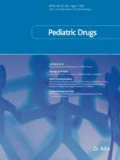Abstract
Background: The greatest burden of disease in children lies in the developing world; however, previous reviews have suggested that few randomized controlled trials (RCTs) involving children take place in developing countries. Children in developing countries deserve the same standard of medicines as those in developed countries, i.e. appropriate medications for the specific diseases that occur.
Objective: To elucidate published pediatric therapeutic RCTs that have taken place in the developing world and to determine whether they are appropriate for the major diseases occurring there, and to explore their approach to safety monitoring.
Methods: A previously assembled database of pediatric RCTs published between 1996 and 2002, from journals indexed in MEDLINE, was analyzed. The main country of setting of the RCTs was categorized as having low, medium or high development status according to the Human Development Index (HDI). Articles were read to add the WHO International Classification of Diseases 10th Revision (ICD-10) category of the disease studied, the WHO Collaborating Centre for Drug Statistics Methodology Anatomical Therapeutic Chemical (ATC) classification system category of the main drug therapy studied, the source of funding, and ethical approval to the variables already recorded in the database.
Results: One hundred and fifty-eight (22%) of the 733 RCTs analyzed took place in medium and low HDI (developing) countries. The disease areas studied seemed appropriate, with 89 (56%) of the 158 RCTs studying infectious and parasitic diseases. Ninety-nine (63%) RCTs from developing countries were trials of antiparasitic and anti-infective drugs. Compared with studies from high HDI countries, a significantly lower proportion of articles from medium and low HDI countries mentioned ethical committee or institutional review board approval, and safety monitoring. Only one paper from low and medium HDI countries mentioned the presence of a safety monitoring committee/data safety monitoring board.
Conclusions: Published pediatric drug RCTs conducted in developing countries appear to study appropriate diseases but the results show that fewer RCTs are undertaken compared with the developed world. The standard of reporting for RCTs from developing countries needs attention to ensure that adequate information can be obtained, especially with regard to safety monitoring.


References
Murray CJL, Lopez AD, editors. The global burden of disease: a comprehensive assessment of mortality and disability from diseases, injuries and risk factors in 1990 and projected to 2020. Cambridge: Harvard University Press, 1996
Commission on Health Research for Development. Health research: essential link to equity in development. New York: Oxford University Press, 1990
Horton R. Medical journals: evidence of bias against the diseases of poverty. Lancet 2003; 361: 712–3
Rochon PA, Mashari A, Cohen A, et al. Relation between randomized controlled trials published in leading general medical journals and the global burden of disease. CMAJ 2004; 170: 1673–7
Sackett DL, Rosenberg WMC, Gray JAM, et al. Evidence based medicine: what it is and what it isn’t. BMJ 1996; 312: 71–2
Isaakidis P, Swingler GH, Pienaar E, et al. Relation between burden of disease and randomised evidence in sub-Saharan Africa: survey of research. BMJ 2002; 324: 702–6
Campbell H, Surry SAM, Royle E. A review of randomised controlled trials published in Archives of Disease in Childhood from 1982–96. Arch Dis Child 1998; 79: 192–7
Sammons HM, Choonara I. Clinical trials of medication in children, 1996–2002. Eur J Clin Pharmacol 2005; 61: 165–7
Sammons HM, Gray C, Hudson H, et al. Safety in paediatric clinical trials: a 7-year review. Acta Paediatrica 2008; 97: 474–7
Hargrave DR, Hann IM, Richards SM, et al. Progressive reduction in treatment-related deaths in Medical Research Council childhood lymphoblastic leukaemia trials from 1980 to 1997 (UKALL VIII, X AND XI). Br J Haematol 2001; 112(2): 293–9
Nolan ML, Greenberg AE, Fowler MG. A review of clinical trials to prevent mother-to-child HIV-1 transmission in Africa and inform intervention strategies. AIDS 2002; 16: 1991–9
United Nations Development Programme. Human development report 2002 [online]. Available from URL: http://hdr.undp.org/en/reports/global/hdr2002/ [Accessed 2009 Dec 22]
World Health Organization. International classification of diseases (ICD) [online]. Available from URL: http://www.who.int/classifications/icd/en/ [Accessed 2007 Jun 29]
World Health Organization Collaborating Centre for Drug Statistics Methodology. Anatomical therapeutic chemical classification of drugs [online]. Available from URL: http://www.whocc.no/atc_ddd_index/ [Accessed 2007 Jun 29]
Miura E, Procianoy RS, Bittar C, et al. A randomized, double-masked, placebo-controlled trial of recombinant granulocyte colony-stimulating factor administration to preterm infants with the clinical diagnosis of early-onset sepsis. Pediatrics 2001; 107: 30–5
Choonara I. Clinical trials of medicines in children. BMJ 2000; 321: 1093–4
Cohen E, Uleryk E, Jasuja M, et al. An absence of pediatric randomized controlled trials in general medical journals, 1985–2004. J Clin Epi 2007; 60: 118–23
Cohen-Kohler JC. The morally uncomfortable global drug gap. Nature 2007; 82: 610–4
Trouiller P. Neglected diseases and pharmaceuticals: between deficient market and public health failure. Lancet 2004; 359: 2188–94
Hopewell S, Dickersin K, Clarke MJ, et al. Publication bias in clinical trials (Protocol). Cochrane Database Syst Rev 2007; (2): MR000006
Abbasi K. Compulsory registration of clinical trials. BMJ 2004; 329: 637–8
Choonara I. Regulation of drugs for children in Europe. BMJ 2007; 335: 1221–2
Martinez-Castaldi C, Silverstein M, Bauchner H. Child versus adult research: the gap in high-quality study design. Pediatrics 2008; 122: 52–7
Acknowledgments
No sources of funding were used to assist in the preparation of this study. Khairun Nor Aripin’s postgraduate studies at the University of Nottingham are fully sponsored by the Malaysian Ministry of Higher Education. Helen Sammons and Imti Choonara have no conflicts of interest to declare that are directly relevant to the content of this study.
Author information
Authors and Affiliations
Corresponding author
Rights and permissions
About this article
Cite this article
Nor Aripin, K.N.B., Sammons, H.M. & Choonara, I. Published Pediatric Randomized Drug Trials in Developing Countries, 1996–2002. Pediatr-Drugs 12, 99–103 (2010). https://doi.org/10.2165/11316260-000000000-00000
Published:
Issue Date:
DOI: https://doi.org/10.2165/11316260-000000000-00000

